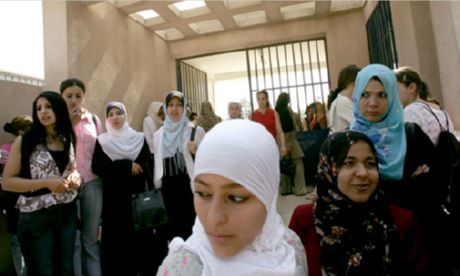New publications
Countries where women are not safe to live are ranked
Last reviewed: 01.07.2025

All iLive content is medically reviewed or fact checked to ensure as much factual accuracy as possible.
We have strict sourcing guidelines and only link to reputable media sites, academic research institutions and, whenever possible, medically peer reviewed studies. Note that the numbers in parentheses ([1], [2], etc.) are clickable links to these studies.
If you feel that any of our content is inaccurate, out-of-date, or otherwise questionable, please select it and press Ctrl + Enter.

While the world is slowly making strides toward the ultimate establishment of gender equality, one troubling issue remains unresolved: the safety of women. Even in developed countries, a significant portion of the female population does not feel safe, especially at night.

A new Gallup study shows that in countries like the US, where 82% of men feel comfortable walking around at night, only 62% of women can say the same.
The world's least safe countries for both sexes are largely war-torn regions in the Middle East, Eastern Europe and Africa. In these countries, men and women feel equally unsafe.
This trend is also true in developing countries, but here the gap between men and women is starting to widen.
Based on a Gallup report, 24/7 Wall St. looked at 10 countries where the gap between men's and women's life safety is the widest.
1. New Zealand
- Women who feel less safe than men: 35%
- Women who feel safe at night: 50%
- Men who feel safe at night: 85%
Most gender equality indicators, except for safety indicators, are high in New Zealand. The World Economic Forum ranks New Zealand fourth in gender equality.
In terms of employment prospects, the proportion of men working full-time is only slightly higher than women: 66% for men and 64% for women. In terms of political participation, 32.2% of members of parliament are women.
Such data would seem to suggest that violence does not exist in the lives of women on this island. But statistics refute this misconception: in 2009, there were 30.58 incidents per 100,000 people, and the country ranked seventh in the frequency of rape out of 94 countries.
In 2011, the United Nations named New Zealand among the worst countries for domestic violence.
2. Algeria
- Women who feel less safe than men: 34% (tied for 2nd place)
- Women who feel safe at night: 32%
- Men who feel safe at night: 66%
Less than a third of women in the North African country of Algeria feel safe at night, the fifth-worst rate in the world. While the proportion of men working full-time compared to women working full-time is almost identical, other indicators of gender equality are less encouraging.
Only 8% of parliament is represented by women. According to the UN, the rate of rape per capita is relatively low, but the reporting may not reflect the truth.
Amnesty International says women's rights are marginalized in the country, with many unresolved issues surrounding violence against women and their rights as "subordinate to men in matters of marriage, divorce, child custody and inheritance."
3. Malta
- Women who feel less safe than men: 34% (tied for 2nd place)
- Women who feel safe at night: 48%
- Men who feel safe at night: 82%
In a 2010 report, the UN Committee on the Elimination of All Forms of Discrimination against Women criticised the approach to women's rights and safety in Malta.
The report expressed concern that domestic violence was a persistent problem in the country and that Maltese socio-cultural attitudes continued to tolerate domestic violence. However, some progress was made when the Maltese Parliament legalised divorce in July 2011.
 [ 1 ]
[ 1 ]
4. Cyprus
- Women who feel less safe than men: 28% (4th)
- Women who feel safe at night: 57%
- Men who feel safe at night: 85%
The percentage of women in employment in Cyprus has increased significantly over the past year: 74% of women are in full-time employment compared to 78% of men.
However, the unemployment rate among Cypriot men was half that of women: only 3% versus 6% in 2011. In many other areas, the situation of women in the country also remains extremely ambiguous.
Women's political participation is limited: only 10.7% of members of the Cypriot parliament are women. They hold only 9% of ministerial positions. The unequal status of women extends to many aspects of their lives in Cyprus, which negatively affect safety. According to the US Department of Commerce in 2010, Cyprus is a "final destination" in the sex trafficking chain.
 [ 2 ]
[ 2 ]
5. Italy
- Women who feel less safe than men: 28% (ranked 4th)
- Women who feel safe at night: 40%
- Men who feel safe at night: 68%
When it comes to gender equality, Italy's numbers are exceptionally low. Only 56% of women are fully employed, compared to 69% of Italian men.
This 13% employment gap is one of the largest in the world. Italy also has a mediocre 2011 Gender Index: with 0.6796 points, it ranks at the bottom of the list of 135 countries in the world. The index is based on women's participation in economic activity, their achievements in education, medicine and politics.
When it comes to safety, gender inequality is particularly pronounced: only 40% of Italian women feel safe, compared to 68% of men.
6. Albania
- Women who feel less safe than men: 27% (tied for 6th)
- Women who feel safe at night: 54%
- Men who feel safe at night: 81%
While more than four in five men in the country feel safe at night, only more than half of women can say the same.
The extent of actual violence against women in the country is difficult to determine. According to the UN, the per capita rape rate is below the global average. However, the country has more than 80 murders per 100,000 people, one of the highest rates in the world.
The high level of violence suggests that rape figures may be underreported. According to Amnesty International, Albania has a serious problem with domestic violence, as well as trafficking of women into forced prostitution.
7. Australia
- Women who feel less safe than men: 27% (tied for 6th)
- Women who feel safe at night: 51%
- Men who feel safe at night: 78%
Less than half of women in Australia feel safe at night. The reason is obvious when you look at the country's rape statistics: in 2009, Australia recorded 91.92 rapes per 100,000 people, the highest rate in the world.
In 2011, the Australian Government launched the National Plan and Programme to Reduce Violence Against Women and Their Children.
According to the Australian Government's website on the program, one in three Australian women will be a victim of physical violence, and almost one in five will be a victim of sexual violence, by the age of 15.
8. USA
- Women who feel less safe than men: 27%
- Women who feel safe at night: 62%
- Men who feel safe at night: 89%
Despite the high GDP in the US, the level of personal safety for women here is extremely low. According to the UN, 88,097 cases of rape in the US in 2009 - more than were recorded in any other country in the world surveyed by the UN.
And those are just the reported cases. One in six American women experiences rape, incest, or domestic violence.
 [ 3 ]
[ 3 ]
9. France
- Women who feel less safe than men: 27%
- Women who feel safe at night: 51%
- Men who feel safe at night: 78%
Less than half of women in France feel safe going out at night, compared to nearly 80% of men who feel safe.
According to the CIA World Factbook, nearly 85% of the country's population lives in urban areas. By many measures, France is one of the most developed countries in the world. More than 98% of residents complete secondary education.
However, in 2009 there were more than 10,000 registered cases of rape. This is one of the worst figures in the world.
10. Finland
- Women who feel less safe than men: 26%
- Women who feel safe at night: 66%
- Men who feel safe at night: 92%
In Finland, 80% of women work full-time, while only 68% of men do so. However, when it comes to personal safety, they feel less safe than men. Although they have the lowest crime rate in the EU, only 66% of Finnish women do not fear for their safety at night.
In its 2012 report, Amnesty International criticised the Finnish state for failing to provide sufficient shelters and clinics for victims of rape and domestic violence.
